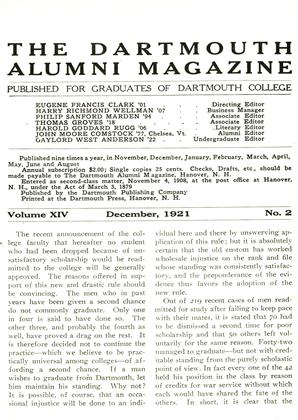Too often it has been the fate of a class that for the first few years after leaving the college, it has lacked proper organization and hence proper ties with the alma mater. And if for these crucial few years the class loses touch with the college, the result is practically certain that it will never regain its close affiliations.
To keep thes ties between the college and the alumni, class organization is necessary. After graduation, fraternity bonds, strong as they may be, are weak compared with those of class. The trouble with most classes which have lacked this proper organization has been that the start was made too late. The senior year in college is the time to make the beginning.
Realizing this and in order to achieve this purpose, a senior eating club in the Grill has been started. The new Cafeteria has reduced the congestion in College Hall so that the Grill has been turned oyer entirely to the seniors, members of other classes being excluded. Meals are being served on a club basis at the rate of $8 a week. It is planned to have an after-dinner speaker twice a week, on which occasions members of the class who are not eating there will come in for the gathering.
At first thought the objection will immediately be raised that such a scheme tends to break up college spirit and is directly hostile to all traditions of Dartmouth democracy. But with a college of some 2000 students, a man cannot hope to know everyone and must logically give special attention to his own class. These are the friendships which are going to count most in afterlife and the time to clinch them is the senior year.
But even granted that a senior eating club would to some extent tend to lessen somewhat the acquaintance of seniors with lower-classmen, would not the advantages outweigh the disadvantages ? Here will be formed closer ties of common feeling and friendship which will not disappear when the class scatters after the four years. Here will be cultivated the class spirit which in later years makes the class a unit. When the alumnus comes back for a reunion it is not the fraternity house that he makes his headquarters. It is the dormitory, where his classmates are. Here is the chance to foster this class feeling.
It is true that this year the senior eating club is on trial. If it succeeds, the plan may be enlarged so as to make the room a senior gathering place at all hours, a true senior club, embracing the entire class. While new at Dartmouth, the idea is not so revolutionary as it may seem at first sight. It has its good points and any scheme which has possibilities for so much good is at least worthy of a trial.
 View Full Issue
View Full Issue
More From This Issue
-
 Article
ArticleALUMNI COUNCIL MEETS
December 1921 By EUGENE F. CLARK -
 Article
ArticleTHE BURYING GROUND
December 1921 By EDWIN JULIUS BARTLETT '72 -
 Article
ArticleTHE FRESHMAN CLASS
December 1921 By E. GOKDON BILL -
 Article
ArticleThe recent announcement of the college faculty that hereafter no student
December 1921 -
 Article
ArticleNEW FACULTY REGULATIONS
December 1921 -
 Sports
SportsFOOTBALL
December 1921







